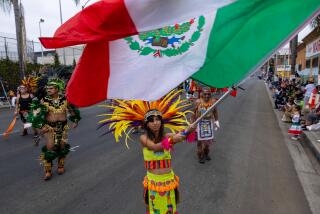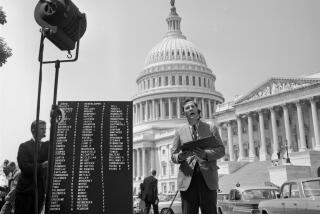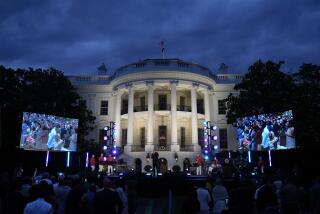Commemorating the Independence Day That Is Juneteenth
- Share via
Juneteenth celebrations commemorating emancipation from slavery have long percolated through African American communities with picnics, family reunions and small parades.
But 132 years after the first Juneteenth celebration, the day is exploding in popularity, and Congress recognized it with a proclamation last month.
Some California cities have long marked the day. East Palo Alto, for example, is gearing up for its 15th celebration, while Stockton and others will have their first. In Orange County, where blacks account for only about 2% of the population, the local NAACP will host the largest commemoration in Southern California. About 5,000 people, nearly twice as many as last year, are expected today from 10 a.m. to 6 p.m. at Lillie King Park in Santa Ana.
While Juneteenth’s growing popularity has paralleled the trend of African Americans to focus on their culture and history, it also has coincided with a sense of racial alienation many blacks feel.
“I think that because of the times, with so much racial disharmony on the rise, black people are focusing more and more on their own cultural background,” said James Tippins, president of the Orange County chapter of the National Assn. for the Advancement of Colored People.
Some black residents of Orange County said Juneteenth takes on even greater significance because there is no central black neighborhood.
“We’re scattered, and because our numbers are so small, blacks in Orange [County] are almost forced to have a greater appreciation of our culture,” said Fran Williams, a psychologist and professor at Rancho Santiago College who specializes in cultural diversity.
Williams, of Santa Ana, said Juneteenth is more a commemoration of an awful memory than a celebration.
“For us, we remember slavery,” Williams said. “It’s an undeniable fact that we suffered through that, and I think it’s good as a people that we don’t put our heads in the sand and pretend it never happened.”
However, the seriousness of problems facing African Americans leaves some disenchanted with Juneteenth.
*
“We’re inventing holidays instead of focusing on the real work we need to be doing--looking at crime, especially black-on-black crime, joblessness, poverty and dealing with the hopelessness that’s so deep in the community,” said James Fugate, co-owner of Eso Won bookstore in Los Angeles. “I find it absolutely ridiculous--it’s like fighting over deck chairs on the Titanic.”
Along with its commemoration of freedom, Juneteenth also recalls suffering and highlights the roots of racial hostility in Americans.
“It has to be a painful day,” said Albert Reed, California director for Juneteenth organizations. “When I go back and look at the shackles in Louisiana where they hung the slaves because they tried to escape, sure it’s painful, it’s torturous.”
Juneteenth was originally commemorated June 19, 1865, when Gen. Gordon Granger landed at Galveston, Texas, a month after the Civil War ended and read a proclamation freeing the slaves. Celebrations erupted, and black Texans carried the tradition of celebrating June 19 throughout the country.
Looking at racial history means people will be reflecting on current conditions.
*
In Southern California, land mines along the road to racial harmony have repeatedly shattered any sense of peace between the races--the Watts riots, the Rodney G. King beating and its ensuing trials and riots, the O.J. Simpson case and the battle over affirmative action.
President Clinton has recognized the problem nationally by creating an advisory panel on race relations, and is scheduled to give a major speech on the subject at UC San Diego today.
It is against this backdrop that Juneteenth has been gaining in appeal.
When the National Assn. of Juneteenth Lineage held its first convention in January in Texas, it drew representatives from about 20 states, including California. The association estimates that more than 130 cities and towns commemorate the day along with thousands of families.
Lula Briggs Galloway, the association’s founder, said she dreams of seeing Juneteenth celebrations spread to all African American communities, taking with it the lessons about slavery that never should be forgotten.
“The Fourth of July is not our Independence Day--our ancestors were in slavery in 1776,” Galloway said.
“We as a black race were not included, so we must correct the wrong information that’s been supplied from generation to generation if we are going to do something about the problems facing us as a people.”
More to Read
Sign up for Essential California
The most important California stories and recommendations in your inbox every morning.
You may occasionally receive promotional content from the Los Angeles Times.










